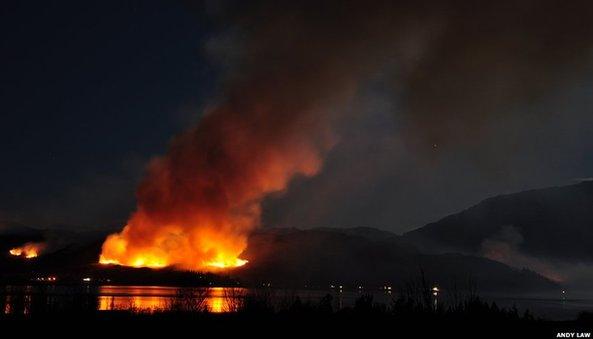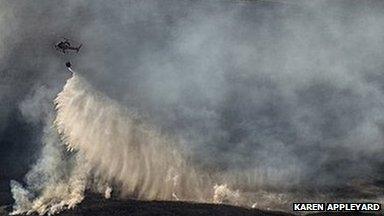'If you drop a match, it just goes'
- Published

Fire crews have been tackling wildfires in parts of the Highlands and Islands, including this one in Glenelg
The past week has seen dramatic images of wildfires lighting up the skies in the Highlands.
But who is to blame for the hill fires? And how will the fire service's ban on further "muir burning" this year affect farmers and estate owners?
For hundreds of years, farmers, crofters and gamekeepers in the Highlands and Islands of Scotland have practised controlled burning of the heather moors.
The Muirburn, as it is known, is done every spring to strip back the old, dead growth of the winter and encourage new green shoots for sheep and cows to graze.
It is an essential part of managing the land - and is controlled by a strict code and within a window of time before birds start to nest.
But for the last three years, fire crews have been left struggling to cope with fires that have spun rapidly out of control.
The unusually cold and dry weather during March and early April has contributed considerably to the speed at which the fires spread.
However, some hill farmers and crofters believe the failure of large estates to muir burn every year that has left areas of the land like a "tinderbox".
Joyce Wilkinson, of the Scottish Crofting Federation, said: "There are estate owners who don't do controlled burning. They are either too lazy, they don't have the men, or they have a policy against it.
"Where it hasn't been done for years and the heather is up to waist height, it's really bad. If you drop a match, it just goes.
"I'd say people should actually be made to do it and prosecuted if they don't."
The suggestion is strongly disputed by the organisation which represents 2,500 landowners across Scotland.
Farming decline
Luke Borwick, chairman of Scottish Land and Estates, said: "It is disappointing to hear how our landowning members are being unfairly blamed for this situation.
"Our members are well used to adhering strictly to the [Muirburn] code.
"Some of these fires have been as a result of careless activity by recreational access takers."
He said members were willing to create a chain of wildfire defence, and had been volunteering their resources to help fire crews.
The decline in hill farming in recent years could also be partly to blame.
A study commissioned by Scottish Natural Heritage in 2011, focused on the north Highlands, western Scottish Borders and the Isle of Skye, found that Scotland's sheep flock fell by nearly 2.9 million between 1998 and 2009.
Where livestock numbers had fallen and land was under-grazed, there was deterioration in vegetation and spread of bracken - all of which can exacerbate wildfires.
Stretched to the limit, the fire service called for a stop to further controlled burning this year, saying conditions were "clearly unsuitable".
Landowners who fail to heed the advice could face prosecution.
But for some, not burning back the land could have serious consequences.
"I've been waiting for the right weather, but this may mean I'll have to wait for next year," said crofter Ms Wilkinson.
"If the hills don't get burned, there's less area for the cattle to graze."
Bloodsucking ticks
Hill farmer Pete Webster said long heather also created a breeding ground for ticks.

Helicopters released water over the fire in Wester Ross, which has now been put out
"They can literally drain animals of blood," he said.
"If you have a lamb that's six to eight-weeks-old covered in ticks, it can die of anaemia."
Ticks also carry diseases, including Lyme disease, a bacterial infection affecting humans. If left untreated, it affects the skin, joints, heart and nervous system.
Ms Wilkinson believes it is essential that the public understands the importance of the annual Muirburn as a way of controlling the land.
"You just have to go on Facebook to see the comments and the anger because people don't understand controlled burning," she said.
"The headlines don't help.
"It can look dramatic, but done properly, controlled burning is so beneficial and actually stops the spread of wildfires in future years."
- Published6 April 2013
- Published4 April 2013
- Published4 April 2013
- Published2 April 2013